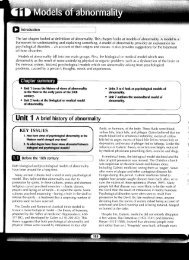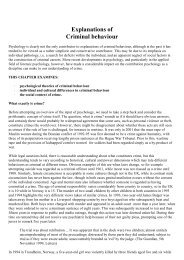David Canter - forensic psychologist - Jeff Standen
David Canter - forensic psychologist - Jeff Standen
David Canter - forensic psychologist - Jeff Standen
You also want an ePaper? Increase the reach of your titles
YUMPU automatically turns print PDFs into web optimized ePapers that Google loves.
higher than 1,505th onthelist of possible suspects and, within a comparatively short<br />
period of time, had gathered enough evidence to convict.<br />
The Duffy case brought profiling into the mainstream of police and media<br />
consciousness but, in some ways, success was a mixed blessing. Although <strong>Canter</strong> had<br />
to apply proven behavioural psychology to the inquiry, there was so little known data<br />
that, inevitably, he found himself working on little more than conjecture from time to<br />
time, and his inexperience told in the presentation of his findings to the police. Instead<br />
of highlighting those areas he considered worthy of further exploration, he delivered a<br />
"pen portrait" of the suspect. This turned out to be uncannily accurate and, not<br />
unnaturally, it was this that drew the bulk of media attention when the details of the<br />
case were made public.<br />
<strong>Canter</strong> was widely hailed in the press as a latter-day Sherlock Holmes. No one was<br />
interested in the science, or lack of it, inherent in the Duffy profile; all that mattered<br />
was the spectacular result, and what the lay public inferred from it was that a bright<br />
<strong>psychologist</strong> armed with a little knowledge about criminal behaviour could make<br />
stunningly accurate predictions about likely offenders for any given crime.<br />
Unfortunately for the reputation of <strong>forensic</strong> psychology, a number of <strong>psychologist</strong>s<br />
and policemen came to exactly the same conclusion.<br />
"Various professionals stepped forward to offer their opinions on inquiries, based on<br />
nothing more than personal experience," says <strong>Canter</strong>. "They had talked to various<br />
criminals over the years, but their ideas were determined by what they happened to<br />
remember, the cases they happened to have worked on, and the importance they had<br />
placed on characteristics they had noticed, and often it was hard to see how they had<br />
reached their conclusions. The police would probably have got just as much help in<br />
identifying likely offenders by talking to a top crime reporter who could remember<br />
umpteen similar cases."<br />
However, while a few <strong>psychologist</strong>s were grabbing their moment of glory, <strong>Canter</strong> and<br />
his research team, backed initially by the Home office, and latterly by the US Army<br />
and the Economic and Social Research Council, set about establishing a more<br />
scientific basis for offender profiling. They examined hundreds of solved crimes in<br />
the minutest detail to collect a database of information which was then used as a<br />
testing ground for various hypotheses and explanations that recommended themselves<br />
from the initial correlations.<br />
The circle theory, which held that, if all the crime scenes of an offender were placed<br />
within a circle, the offender would be found to be living within that circle, possibly<br />
close to the centre, emanated from the Duffy inquiry and was subsequently validated<br />
by a study of burglaries. other ideas have been disproved. For years it was widely<br />
believed that burglars who moved on to rape would choose to commit their crimes in<br />
indoor settings that were consistent with previous offences, but this has not been born<br />
out by the evidence.<br />
<strong>Canter</strong>'s aim is to break down the traditional ways that crime detection is approached<br />
in this country and to encourage those involved to take a broader view of their work.<br />
"Criminologists have always tended to focus on the differences between offenders and<br />
law-abiding citizens, rather than those between different types of criminal, and the







